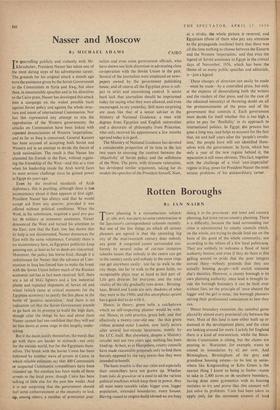Nasser and Moscow
By MICHAEL ADAMS CAIRO IN quarrelling publicly and violently with Mr. Khrushchev, President Nasser has taken one of the most daring steps of his adventurous career. The grounds for his original attack a month ago were the assistance given by the Soviet Government to the Communists in Syria and Iraq;. but since then, in innumerable speeches and in his directives to the Cairo press, Nasser has developed this attack into a campaign on the widest possible basis against Soviet policy and against the whole struc- ture and intent of international Communism. Nor has this represented any attempt to win the approbation of the Western governments; the attacks on Communism have been linked with repeated denunciations of Western `imperialism,' and as far as Iraq is concerned, General Kassem has been accused of accepting both Soviet and Western aid in an attempt to divide the forces of Arab nationalism. The result is that Nasser has alienated his friends in the East, without regain- ing the friendship of the West—and this at a time when his leadership inside the Arab world faces its most serious challenge since he gained power in Egypt six years ago.
Even by the involved standards of Arab diplomacy, this is puzzling, although there is less inconsistency about it than appears at first sight. President Nasser' has always said that he would accept aid from any quarter, provided it was offered without political conditions. When the West, in his submission, required a quid pro quo for its military or economic assistance, Nasser denounced the West and turned his attention to the East; now that the East, too, has shown that its help is not disinterested, Nasser denounces the East with the same vehemence. Certainly there is no inconsistency here, as Egyptian publicists keep pointing out, at least as far as deeds are concerned. Moreover, the policy has borne fruit, though it is unfortunate for Nasser that the advance of Com- munism in Iraq has forced him to make the break with the Soviet Union before much of the Russian economic aid has in fact been received. Still, there are a lot of MiG fighters and a few industrial plants and repeated shipments of Soviet oil and wheat (which came at critical moments for the Egyptian economy) to justify the last phase in the battle of `positive neutralism.' And there is no indication yet that the Soviet Government intends to go back on its promise to build the high dam, though after the things he has said about them Nasser cannot feel too confident that they will not let him down at some stage in this lengthy under- taking.
But if the deeds justify themselves, the words that go with them are harder to stomach—not only for the outside world, but for the Egyptians them- selves. The break with the Soviet Union has been followed by another wave of arrests in Cairo, in which reliable estimates say that 400 Communist's or suspected Communist sympathisers have been rounded up. No mention has been made of these arrests in the local press, though Cairo has been talking of little else for the past few weeks. And it is not surprising that the government should feel some embarrassment at the necessity to lock up, among others, a number of prominent jour- nalists and even some government officials, who have shown too little discretion in advocating close co-operation with the Soviet Union in the past. Several of the journalists were employed on news- papers owned by the government publishing house, and of course all the Egyptian press is sub- ject to strict and unremitting control. It seems hard luck that journalists should be imprisoned today for saying what they were allowed, and even encouraged, to say yesterday. Still more surprising are cases like that of a senior adviser in the Ministry of National Guidance, a man with degrees from Egyptian and English universities and a doctorate of philosophy from Princeton, who only received his appointment a few months ago and today is in gaol.
The Ministry of National Guidance has devoted a considerable proportion of its time in the last two years to stressing the contrast between the `objectivity' of Soviet policy and the selfishness of the West. The press, with tiresome reiteration, has developed similar arguments, taking for its models the speeches of the President himself. Now, at a stroke, the whole picture is reversed, and Egyptians (those of them who pay any attention to the propaganda machine) learn that there was all the time nothing to choose between the Eastern and the Western 'imperialists,' and that Oren the legend of Soviet assistance to Egypt in the critical days of November, 1956, which has been the theme of so many public speeches and editorials, is—just a legend.
These changes of direction can easily be made —must be made—by a controlled press, but only at the expense of demoralising both the writers and the readers of that press, and (in the case of the educated minority) of throwing doubt on all the pronouncements of the press and of the government that controls it. Each government must decide for itself whether this is too high a price to pay for 'flexibility' in its approach to international politics. In Egypt, 1,11e process has gone a long way, and helps to account for the fact that, six and half years after the 'people's revolu- tion,' the people have still not identified them- selves with the government. In Syria, which has only a year of the new regime behind it, the separation is still more obvious. This fact, together with the challenge of a rival 'anti-imperialist' regime in Iraq, poses for President Nasser the most serious problems of his extraordinary career.


































 Previous page
Previous page